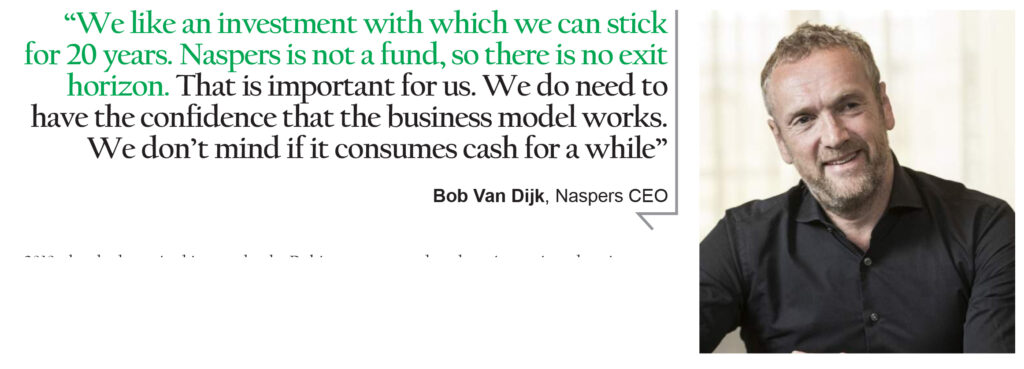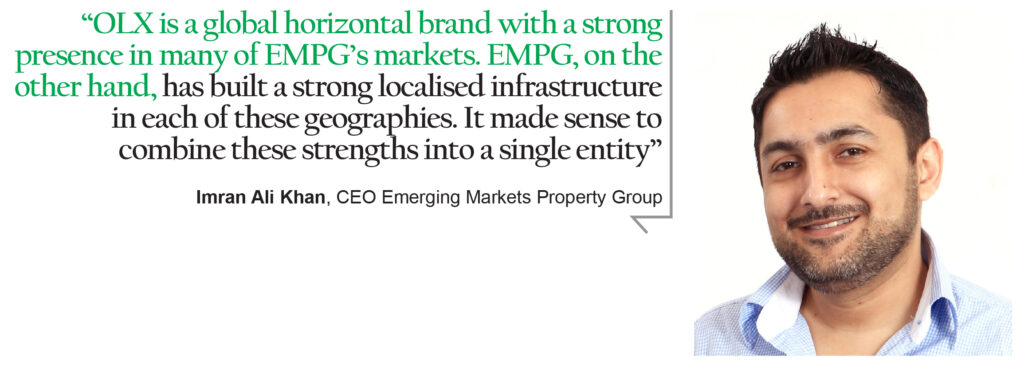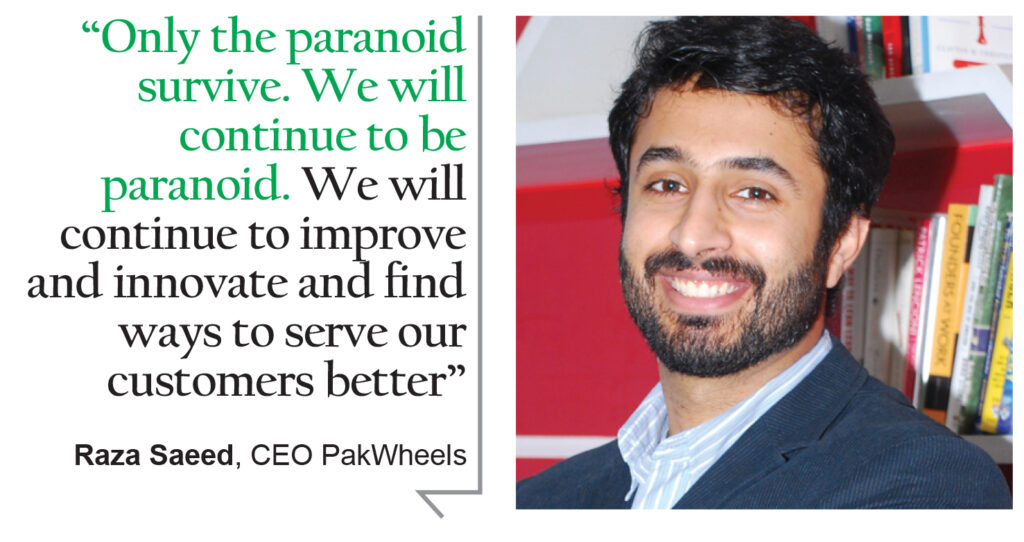The lives and successes of brothers Zeeshan, Imran and Haider Ali Khan have been extensively chronicled and billed as a success story. Founded in 2006, their high-flying property portal start-up, Zameen.com, has quickly become one of the largest property portals in the world. Now, Zameen.com’s parent company – the Emerging Markets Property Group (EMPG) – has vaulted into the unicorn club after its merger with classifieds giant, the OLX Group.
The EMPG-OLX merger was announced on April 29, 2020 in Pakistan, the UAE, Egypt and Lebanon. The transaction includes a funding round of $150 million out of which $75 million will be invested by existing EMPG shareholders, with the remaining $75 million being invested by the OLX Group. The transaction values EMPG at $1 billion, making the merged entity the third unicorn created by Pakistani founders following Afiniti and KeepTruckin, with the OLX Group becoming the single largest owner of EMPG at 39% per cent shareholding .
Out of the four geographies where the merger transaction took place, OLX already had a presence through its local brand of the same name {OLX} in Egypt and Lebanon. These platforms have now been merged into EMPG which plans to roll out new services for the real estate community, besides promising to offer consumers a better experience across all categories. In Pakistan and the UAE, both groups had platforms under their own local brand names. In the UAE, EMPG has Bayut whereas in Pakistan, it is Zameen. OLX’s local brand for UAE is Dubizzle whereas in Pakistan, it operates as OLX Pakistan. In both these countries, EMPG will operate these brands which will continue operations under their respective local brand names.
“OLX is a global horizontal brand with a strong presence in many of EMPG’s markets,” says Imran Ali Khan, the CEO of EMPG and co-founder of Zameen.com. “EMPG, on the other hand, has built a strong localised infrastructure in each of these geographies. It made sense to combine these strengths into a single entity.”
While the merger may be relatively clean and simple, where the point of interest lies in who EMPG has decided to do business with. OLX is the classifieds business of the South Africa based media and technology giant, Naspers, and partnering with them is surely an exciting opportunity for EMPG. In fact, Naspers was an early investor in Tencent and holds 30% stake in the company, its most successful investment so far. It runs the OLX Group through a Netherlands-based spinoff company called Prosus. This puts Naspers in the same league as Softbank, and is counted among the big six technology investors in the world. Any merger involving them is going to be a big deal for a company like EMPG.
But things are not completely peachy. For starters, while the Khan brothers may have managed to create a unicorn, rumours are that if they have not exited already, they are on the verge of it. There is no definitive answer on this, but the key is Naspers, which has a history of high-stake mergers that eventually end in the founders of the companies they merge with exiting completely.
It didn’t help matters when the co-founders refused to disclose specific details about the exit strategy of any of the shareholders or the lead up to the merger. They were also secretive about the holding structure of EMPG, and did not even confirm whether or not they were majority shareholders in the company after the transaction, in response to queries made by Profit.
To get to the bottom of this, it is necessary to look to the past. Back in 2012, Zameen.com raised its first angel investment from an investor of European origin, in 2012. This was followed by a Series A round in 2014 in which Zameen.com raised an undisclosed amount from Singapore based-Catcha Group and Malaysia based-Frontier Digital Ventures (FDV) in which both the funds received significant but non-controlling shares in Zameen. From FDV’s financials available publicly, it owns 30% shares in Zameen.com.
A source has disclosed to Profit that there are only two shareholders in Zameen.com; FDV and EMPG. So the remaining 70% is held by the EMPG. Since OLX is now the single largest shareholder in EMPG at 39%, by extension OLX has 27.3% shareholding in Zameen.com. That leaves 33.7% shareholding that the rest of the shareholders at EMPG can possibly hold in Zameen.com. That effectively puts the brothers in a minority in at least Zameen.com. Furthermore, from what Profit got to know from another source, there is another shareholder in EMPG: Kingsway Capital. That further reduces the shareholding of the original co-founders and brothers in Zameen.com. It might also be possible that an investor might have exited in the merger and funding transaction, but there is no news of that sort and neither Zeeshan nor Imran gave us any clue. From what our source told us, neither the brothers nor Kingsway Capital, have exited during the transaction.
Extrapolating from this, there is a strong case to be made for the possibility that the co-founders might have decided to exit from Zameen.com and EMPG after this transaction. It might as well be a prudent business decision, and a lucrative deal might have been worked out. We can only wait and see how it unfolds.
It is not only because of the assumptions based on shareholding percentages that we know. It has more to do with the classifieds business and the competition that might have brought about an exit for the brothers.
A merger of equals?
Naspers is big, and as their Chief Executive Officer (CEO) likes to explain, their business strategy is not to invest with the intention of making some money and exiting. Which is why, the merger between OLX and EMPG may not be one between equals, and the history and nature of Naspers may have forewarned the Khan brothers that they may have to exit eventually.
For Naspers, it is about fostering growth. “We like an investment with which we can stick for 20 years. Naspers is not a fund, so there is no exit horizon,” says Bob Van Dijk, the Naspers CEO. “That is important for us. We do need to have the confidence that the business model works. We don’t mind if it consumes cash for a while.”

This is Naspers’ typical strategy, which is to keep investing in the business for as long as it is required to make it profitable. However, there is a flip side to this positive approach, which is that since Naspers continues to invest heavily, it usually ends up completely acquiring that business it involves itself in. And nowhere has Naspers applied this method more than in their classifieds business.
For instance in March 2013, Naspers merged its Slando.ru and OLX.ru assets with a $50 million investment in Russia in exchange for an 18.6% interest in another Russian classifieds platform called Avito. Similarly, in December 2015, Naspers, through OLX Group, injected a whopping $1.2 billion to fuel long-term growth of Avito and bought shares from existing shareholders to increase its stake to 67.9%, creating a unicorn in Avito in the process. A subsequent injection of a sum of $1.16 billion in January 2019 increased Naspers’ stake in Avito to 99.6%.
Avito was a competitor, and acquiring it meant Naspers could create a leading general classifieds business in one of the largest countries in the world.
Another example of this ‘invest and acquire’ strategy was on display when Naspers invested in the UAE’s leading property portal, Dubizzle, for a 51% stake in 2013. By 2018, they had acquired it completely. Dubizzle has now been merged with the EMPG’s Bayut platform in the emirates.
However, during all this time while Naspers was investing further and further in their classifieds business, which included Dubizzle, they were also taking hits in the millions of dollars. Despite this, they did not change course and maintained their investment strategy. but Naspers kept on investing. They finally made profits from its classifieds business in 2019 – a validation of its strategy. In 2019, the company reported a profit of $2 million from its classifieds business. For the year 2020, classifieds profits of Naspers have jumped to $44 million.
This is a story the company uses to extol their own virtues. “Our classifieds business, we started investing in it eight or nine years ago,” says CEO Dijk at a recent conference. “It made an operating loss for seven years but it turned profitable last year (2019). Everybody said it’s a great business and well, we told you it’s great!”
Naspers push into classifieds had become more aggressive in 2018. In an interview with CNBC Africa, the Naspers CEO underscored classifieds as “one of the segments that we are focusing on, and where we will spend our money and also where we will deploy most of the capital going forward.”
Naspers boldy says that its investments into classifieds business are part of its strategy to consolidate its global presence as the leader in classifieds. It is because of this strategy that the co-founders of EMPG might have thought about exiting before they eventually found themselves with no other choice. This is classic Naspers, and the Khan brothers will be more than aware of this.
The world of classifieds
The classified ads industry has evolved from those drab, blocky, black-and-white text only print ads in newspapers, into digital and online ads with all sorts of visuals and hooks. And as with all things going digital, the cost of putting online ads has come down as well, compared to the pricey print advertisement. But for a platform putting those ads online, money would not be earned easily unless the platform is the leader in the space.
In the world of classifieds, Zameen.com started out by carving a niche for itself in the real-estate segment and has since conquered it. But it did not really do so through classifieds alone. It evolved from a classifieds focused tech company into a full-fledged sales and marketing and real-estate development company. It is the evolution of its business model that defines the evolution of Zameen, and that is what has helped it grow exponentially and stay ahead of the competition.
Zameen.com was created in 2006 by brother duo Zeeshan and Imran to list properties of real-estate agents on its portal in what was the newly crafted classifieds model. Sellers would post free ads on the portal to get buyer leads for a property. More and more real estate agencies would post properties on Zameen.com which would generate leads for these sellers and higher conversion rates.
As the portal would become famous, more and more sellers and buyers would visit it. More traffic on the portal would mean the portal was valuable for buyers and sellers, and Zameen would eventually move on to paid listings in 2010. Zameen’s sales teams would take onboard real-estate agencies to advertise properties on its platform under different packages, ranging from a few lacs to over a million rupees.
It would also evolve to start exclusive marketing of real-estate projects. The way this worked was that Zameen.com would market the property of a real-estate developer, and then would collect hefty commissions when the sale was finally made. This was essentially an offshoot into traditional real estate business with many non-tech players like Star Marketing already providing a similar service to developers. For the years to come, it also invested in its own real-estate development projects such as apartment complexes and malls. Its development projects include Zameen Opal in Lahore, Zameen Ace Mall Islamabad, Zameen Ace Homes Islamabad and Mall 35 Rawalpindi.

This varying business model is what has fuelled Zameen’s growth. So much so that from $1 million in revenues in 2015, Zameen’s revenues in 2019 had gone up to a staggering $42 million which should have put the brothers in a strong negotiating position with Naspers.
Playing the stages
The classifieds business is by nature one that can only make money when there is just a single player. Back in 2010, after establishing themselves as an important player in Pakistan’s real estate sector, Zameen moved to paid listings. This was the first crack, and in 2012, OLX started its classifieds business in Pakistan with ‘free’ ad space on its platform, giving Zameen.com its natural nemesis. However, even the ad space on OLX remained free only until 2018. Until this point, real-estate agencies would be able to post free ads on OLX instead of paid ads at Zameen.com, and that would affect Zameen’s revenue. By 2018, when both companies had finally moved to paid listings, the real competition was on. It was a matter of time before something gave, and with Naspers out-spend strategy and much vaster resources, a merger was possibly the best outcome for EMPG and Zameen.com.
Naspers has operated OLX itself in Pakistan since 2012, growing it to over 7 million users per month. From what some sources tell Profit, Naspers was spending roughly $5 million a year on its OLX business in Pakistan. For the eight years OLX has been operational in Pakistan, roughly $40 million have been invested in it. Accounting the income that it made during these years, sources say that OLX was burning roughly $3 million per year on classifieds in Pakistan.
However, there is no such thing as a free ad, at least not forever. In the long run, nobody makes money by continuing to provide free of cost space. The only reason to continue to give your space out for free is if you are ready to burn some cash to dry out your competitor of funds, reach a scale large enough that you can keep your competitor from growing, and eventually acquire it. Something that Naspers has done in other markets.
Classifieds alone would not make money for OLX and neither for Zameen – at least not enough to sustain the business on its own in the presence of a competition. While OLX had Naspers at its back, Zameen raised new rounds. Zameen’s sales and marketing model flourished, as is evident from its revenues.
Because of this evolution, Zameen.com might not necessarily be a technology company anymore. If the major chunk of their revenue came from sales and marketing and development segments, that is what predominantly non-tech, conventional real-estate agencies like Bahria Town or Star Marketing do as well. This blurs the distinction between Zameen being a technology company against what all these non-tech agencies are. The management refused to disclose how much of the revenue came from the ‘tech’ component of the business for us to conclude that Zameen is purely a technology company.
Imran, however, replied with a cliché that all the companies in the world, big or small, leverage technology in their operations one way or the other and therefore Zameen.com is a technology company. Zameen.com aside, the group as a whole, with its OLX portfolio companies after the merger, is overall technology-oriented.
And while Zameen transformed its business model, the OLX Group decided to evolve into the same model of providing sales and marketing services for real-estate development projects. The model was put into effect in 2018. But the model was not like Zameen. Where Zameen would do end-to-end sales and marketing, OLX would generate leads of prospective buyers online for a particular project and hand those leads over to the project owners who would then close those deals through their own sales teams. OLX would earn hefty commissions on these leads as well.
More than anything, sources in the industry believe that if anyone could challenge Zameen in real-estate, it was OLX. And rather than giving up, OLX was encroaching on Zameen’s share as a real-estate leader. Instead of backing out, in January 2020, OLX held its first property expo in Islamabad that the company claimed attracted a footfall of 25,000 visitors in two days.
While OLX evolved its model in 2018, another company entered the real-estate market with the sales and marketing and real estate development models and an online property portal. This was the Graana group of companies run by Shafiq Akbar, presumably a close friend of Special Assistant to the Prime Minister, Zulfi Bukhari. The company claims that it has a stellar reputation in the real estate industry in the United Kingdom and is now expanding its operations into Pakistan. Graana’s online portal, however, is relatively small, averaging 60,000 users a month on its website. But another player means smaller market share, perhaps in the long run, for the other two.

What Zameen pursued in Pakistan, it replicated, minus the real-estate development model, in the UAE with Bayut.com. While Pakistan was a playground for Zameen, in the UAE, things were pretty different.
The classifieds war in the UAE was with OLX Group that entered the Emirates market after their 2013 acquisition of the earlier mentioned Dubizzle and Property Finder – another leading real-estate portal that raised serious sums in its financing rounds. Sources say that in the UAE, Property Finder is the leading property portal. However, all three of them claim that they are the number one property platform in the UAE.
Profit’s analysis of the website analytics of the Bayut and Property Finder reveals that both of them roughly averaged 2 million users per month for the first six months of 2020. Dubizzle, on the other hand, averaged 5.67 users per month for the same six months. Dubizzle, the UAE platform of OLX, is a general classifieds platform that has other classifieds categories like autos and careers as well, besides real estate. Therefore gauging the number of users searching only for properties on Dubizzle is difficult. Nonetheless, as sources tell us, Dubizzle is no less formidable than the other two, and all three of them retain their reputation and status as the three companies on top of the property portal game in the UAE.
In turn, the competition has been fast paced and stiff. In April 2018, Naspers injected $190 million into Dubizzle and acquired it completely. In November 2018, Property Finder raised $120 million from private equity firm General Atlantic to scale its operations. Bayut followed with an announcement of raising $100 million Series D investment in February 2019. The clear conclusion? For now none of them is ready to back out.
So what do you do with a three-way mexican standoff and no one flinching? While the details about the lead up to the merger are still being kept under wraps, it was apparent way beforehand that at least two would have to merge to keep the third from growing. Naspers would be ready to burn for as long as it would be required, so it was probably EMPG that blinked first, and the Khan brothers were perhaps already aware at this point that they may have to exit.
In conversation with Profit, Imran, obviously, said that neither OLX nor EMPG was needy enough to initiate the merger deal and that it was a mutual decision.
Sources that had been watching the EMPG, OLX deal closely said that merger in Pakistan was not that significant. It was what had played out in the UAE that was more important, with Dubizzle joining Bayut being the ‘sweetest’ part of the deal.
“Everything else is pretty small. The jackpot in this deal is Dubizzle. I am actually surprised that OLX took only 39% in the deal,” the source said. Interestingly, other than in Pakistan, Property Finder is a competition to both OLX and EMPG in UAE, Egypt and Lebanon – places where both decided to merge their operations.
EMPG has been a heavyweight in classifieds. It has acquired smaller players before. For instance, in Pakistan and the Middle East, EMPG acquired Rocket Internet-backed Lamudi’s business in 2019. This was followed by another acquisition of Lamudi’s portals in Philippines, Indonesia and Mexico in May 2020, shortly after the merger was announced. But there has never been any news about Zameen even trying to buy OLX. A partnership, therefore, made sense.
“Even though the merger was announced a couple of months ago, our relationship with the OLX Group goes back around five years. Joining forces in MENA, South Asia and Southeast Asia had been in discussion for well over a year and the benefits of such a deal were obvious to both parties,” says Zeeshan Ali Khan.
Another technique typical of Naspers is that it empowers local entrepreneurs to run businesses. It did the same in India with Flipkart, PayU and Swiggy. And it has entrusted the brothers from Pakistan to run EMPG and OLX’s platforms in locations where the mergers took place. For now, the brothers deny any clauses in the merger deal for any call or put options, meaning that they are probably going to stay – for now.
Sources close to Naspers say that the company maintains very high and strict standards. For now, the brothers might have been given a chance by Naspers to grow the merged entities, but if they are unsuccessful, Naspers would not hesitate to ask for an exit.Much like the first transaction with Avito and its eventual acquisition, is Naspers going to acquire EMPG? It is definitely going to be worth the wait. What that means is that EMPG might have become a Naspers company in which Khan brothers have some shareholding. If it has not already become one, it would eventually, and we would like to say inevitably, become a Naspers company that would be run by Khan brothers in the top management, with Naspers calling the shots behind the scenes.
A clash of the titans in Pakistan?
For now, the classifieds’ kings in Pakistan, Zeeshan Ali Khan and Imran Ali Khan, plan to lead the classifieds war for OLX and EMPG in Pakistan against Graana in real estate, PakWheels in autos and Rozee.pk in careers.
The game almost seems rigged, given the resources and stature of Naspers and what that could do for the Pakistani market. Zameen was already the biggest in real-estate in the country, and it just got bigger after merging with OLX. When asked, the Competition Commission of Pakistan (CCP) told Profit it was still too early to say whether or not this was a monopoly. The CCP is still in the early stage process of evaluating the merger application and said that it was too early for them to declare it a monopoly.

But whether these two are forming a monopoly or not is besides the point, because a major competitor is entering the classifieds field, and they may disrupt the plans that the merger had for Pakistan. Daraz, the AliBaba owned entity, are also looking to enter the classifieds game. This changes the dynamics altogether.
It is unclear whether Alibaba is backing this move by Daraz or not. In conversation with Profit, a source reliably said that the decision by Daraz to move into classifieds is taken by Daraz management in Pakistan and the Alibaba Group has nothing to do with it. But if Daraz manages to make this a fruitful move, and get the attention of its parent company over in China, it changes things. If Alibaba starts looking into this strategy more aggressively and pushes for Daraz to compete head on with the now merged OLX and EMPG, Naspers would be competing head on with Alibaba.
The rationale for Daraz moving into classifieds is that it is already a marketplace that has developed over time and has created its own ecosystem. It has user traffic on its website, it has payment processing and delivery solutions. It is already connecting businesses with customers through a marketplace so it plans to open that marketplace up for customers looking to sell items to customers. Simply put, they are connecting individual sellers with individual buyers, which is exactly what OLX is doing right now.
But unlike OLX, Daraz plans to solve the problems that arise during the transaction between an individual buyer and a seller. For instance, if you do not want to go through the hassle of meeting a stranger (meeting a stranger is a normal course of things during a traditional classifieds transaction), you post a product on Daraz and negotiate with potential buyers but when the right buyer is found, Daraz is going to make the trade happen. Customers would be able to prepay or do cash on delivery (COD) but Daraz riders would pick up the product from the seller, package it and deliver it to the customer. For the buyer, it would be like an escrow payment where the payment will be held by Daraz for a couple of days and if the buyer is happy with the product, Daraz will release the payment to the seller.
Our source on this liked to call it ‘assisted classifieds’, but did not mince words in saying that Daraz would be directly breaching OLX’s space.
The revenue model is going to look different as well as compared to OLX. A more lucrative one actually, a source in the industry said. Where OLX charges a posting fee for ads, Daraz is going to take a percentage as commission for the transaction. At the same time, Daraz’s focus remains on consumer goods for C2C, and rightfully so, it is what they have been doing successfully for some time now. But would it be moving on to other segments like autos, real-estate and careers? The jury is still out on that, but they may very well.
“Daraz plans to get into OLX’s space. Besides consumer goods, other verticals might be on the cards. Daraz can potentially move into autos and real-estate because the opportunity in that is still huge,” said a source. “It is still about a year away [since Daraz has not launched yet], but they [Daraz] will do it.”.
While Daraz is planning to impinge into OLX’s space, it would be logical for OLX to start a B2C marketplace like Daraz.
Regardless of OLX moving towards a B2C (Business-to-consumer) marketplace model, the Zameen management is poised to move to horizontal classifieds more aggressively. By horizontal we mean general classifieds, like OLX, with pretty much every category possible for instance autos and careers. While at EMPG and Zameen the brothers were focused entirely on and dedicated their energy towards real-estate vertical, the classifieds kings in Pakistan would be leading the merged entity towards autos and careers as well.
It remains unclear how successful the brothers will be in leading the EMPG in other categories such as autos and careers. They might never have intended to enter other segments. Even the name [Emerging Markets Property Group] suggests a focus on real-estate. But Zeeshan had a varying answer.
“The group had already acquired a horizontal portal, Kaidee, in Thailand before the OLX merger took place, so moving into the wider classifieds space was already on the cards. With OLX coming into EMPG, there are several markets where we will be actively pursuing a horizontal classifieds play. The existing real estate verticals across the group, however, will remain as they are aside from developing synergies with their horizontal sister companies,” Zeeshan told Profit.

While it is beyond question that the brothers know how classifieds work, in categories besides real estate, they would be new entrants with established competitors.
In careers for instance, Rozee.pk is a household name. It has been able to keep a major market share because it is focused only on the careers segment. And careers is a different play altogether, claimed Rozee.pk CEO Monis Rahman in an earlier interview with Profit, providing some general insights into how Rozee has competed with its competitors in careers over the years. (Editor’s note: Monis Rahman was interviewed before OLX had disclosed its plan to enter the career classified space).
“When you talk about careers, it is a very involved business. For jobs you need to get much deeper. Job matching is not like advertising like in other segments,” said Monis. “You need to get an applicant’s career profile and their CVs and then match them with the company that is looking for applicants that require those skills and portfolio.”
“That involves a lot of AI (artificial intelligence) and matching which gets good with data and Rozee.pk has a lot of data. We have 9.8 million CVs on Rozee,” claimed Monis.
It is not just on the basis of data that Monis claims Rozee has been able to keep ahead of the competition, it is also the superior user experience on Rozee’s portal.
And Rozee is already working to further consolidate its position as the leader in careers classifieds by launching a portal for blue collar jobs called Rozgar.pk that will help users find blue collar workers, for instance household servants, plumbers etcetera.
Now what about the autos? There are different versions in the market about who the market leader in autos classifieds is. Most say that PakWheels leads the autos space while some bet on OLX. If it really is PakWheels, it is because PakWheels management is focused only on autos, providing adjunct services besides classifieds to keep itself ahead of the competition.
For what’s ahead and how PakWheels plans to compete with an even bigger competitor after the merger, Raza Saeed, the CEO of PakWheels, had a radical answer. “Only the paranoid survive. We will continue to be paranoid. We will continue to improve and innovate and find ways to serve our customers better,” says Raza.
While both Monis and Raza appear confident, competition with Naspers means that these two might also meet the same fate as that of the brothers, Zeeshan, Imran and Haider Ali Khan. And with EMPG’s replenished war chest, both Monis and Raza would have to be on their toes. The only breathing space they would have would be if Daraz is able to successfully keep EMPG on its toes as well.





































A wonderful article. Provides in depth info & market assessment.
Bravo , keep it up